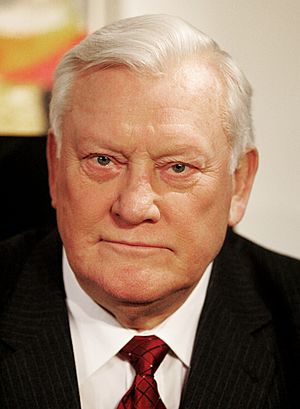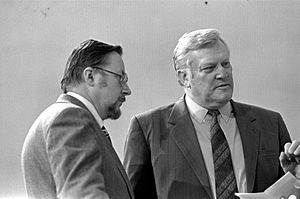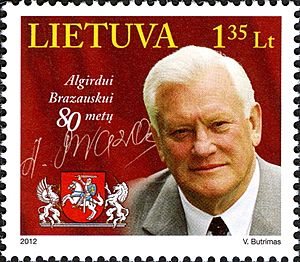Algirdas Brazauskas facts for kids
Quick facts for kids
Algirdas Brazauskas
|
|
|---|---|

Brazauskas in 2005
|
|
| 12th Prime Minister of Lithuania | |
| In office 29 June 2001 – 1 June 2006 |
|
| Preceded by | Eugenijus Gentvilas |
| Succeeded by | Zigmantas Balčytis |
| 4th President of Lithuania | |
| In office 25 November 1992 – 24 December 1998 Acting to 25 February 1993 |
|
| Preceded by | Vytautas Landsbergis (as Chairman of the Supreme Council of Lithuania) |
| Succeeded by | Valdas Adamkus |
| Speaker of the Seimas | |
| In office 25 November 1992 – 25 February 1993 |
|
| Preceded by | Vytautas Landsbergis (as Chairman of the Supreme Council of Lithuania) |
| Succeeded by | Česlovas Juršėnas |
| Deputy Prime Minister of Lithuania | |
| In office 17 March 1990 – 10 January 1991 |
|
| Chairman of Presidium of the Supreme Soviet of Lithuanian SSR | |
| In office 15 January 1990 – 11 March 1990 |
|
| Preceded by | Vytautas Astrauskas |
| Succeeded by | Vytautas Landsbergis (as Chairman of the Supreme Council of Lithuania) |
| First Secretary of Central Committee of the Communist Party of Lithuania | |
| In office 20 October 1988 – 19 December 1989 |
|
| Preceded by | Ringaudas Bronislovas Songaila |
| Succeeded by | Mykolas Burokevičius |
| Personal details | |
| Born | 22 September 1932 Rokiškis, Lithuania |
| Died | 26 June 2010 (aged 77) Vilnius, Lithuania |
| Political party | Communist Party of Lithuania (1957–1990) Communist Party of the Soviet Union (1959–1989) Democratic Labour Party of Lithuania (1990–1993, 1998–2001) Independent (1993–1998, DLP membership suspended while president) Social Democratic Party of Lithuania (2001–2010) |
| Spouses | Julija Brazauskienė Kristina Brazauskienė |
| Children | 2 daughters (from first marriage) |
| Alma mater | Kaunas University of Technology (1956) |
| Signature | |
| Military service | |
| Allegiance | |
| Branch/service | |
| Years of service | 1956–1960 |
| Rank | |
Algirdas Mykolas Brazauskas (born 22 September 1932 – died 26 June 2010) was an important political leader in Lithuania. He served as the first directly elected President of a newly independent Lithuania from 1993 to 1998. Later, he became the Prime Minister from 2001 to 2006. Brazauskas also led the Communist Party of Lithuania during a time when it broke away from Moscow.
Contents
Algirdas Brazauskas: A Leader for Lithuania
Algirdas Brazauskas played a key role in Lithuania's journey to independence and its early years as a free country. He helped guide the nation through big changes.
Early Life and Education
Algirdas Brazauskas was born in Rokiškis, Lithuania. He finished high school in Kaišiadorys in 1952. In 1956, he graduated from Kaunas Polytechnic Institute. He earned a degree in civil engineering. Later, in 1974, he received a PhD in economics.
Beginning His Political Journey
Brazauskas started working in the government of the Lithuanian Soviet Socialist Republic in 1965. He held various positions within the Communist Party of Lithuania.
- From 1965 to 1967, he was the minister for construction materials.
- From 1967 to 1977, he served as a deputy chairman of the State Planning Committee.
- From 1977 to 1987, he was a secretary of the Central Committee of the Communist Party.

In the 1980s, Brazauskas became a more moderate leader. He began to support reforms as nationalist feelings grew in the Soviet Union. He realized that Lithuania needed to move towards independence.
Leading the Communist Party to Independence
In 1988, Brazauskas became the first secretary of the Communist Party of Lithuania. Under his leadership, the party supported Lithuania's independence movement. It broke away from the Communist Party of the Soviet Union. This was a very brave step, as no other local communist parties in the Soviet Union had done this. Many historians believe this act showed that the Soviet Union was truly coming to an end.
The Communist Party of Lithuania then changed into the social-democratic Democratic Labour Party of Lithuania. This party later merged into the Social Democratic Party of Lithuania.
Becoming President of Lithuania
After the 1992 parliamentary elections, Brazauskas became the speaker of the parliament. He also served as acting President of Lithuania starting on 25 November 1992. In the presidential election, he won with 60 percent of the votes. He officially became President on 25 February 1993. During his time as president, he paused his membership in any political party. This is because the Lithuanian Constitution does not allow the president to be a formal member of a political party.
Brazauskas decided not to run for re-election. He handed over the presidency to his successor, Valdas Adamkus, on 25 February 1998.
Return to Politics as Prime Minister
After a short time away from politics, Brazauskas returned. He became Prime Minister on 3 July 2001. He served in this role until 1 June 2006. His government resigned after the Labour Party left the ruling coalition. Brazauskas then announced that he was finally retiring from politics.
He continued to lead the Social Democratic Party of Lithuania for another year. He remained an important voice in Lithuanian politics until his death.
Honours and Recognition
Algirdas Brazauskas received many awards and honours during his life. These included the Order of Vytautas the Great with the Golden Chain. This is one of Lithuania's highest honours. He also received the Order of Honour from the Russian President for his work in improving relations between Russia and Lithuania.
Illness and Passing
Brazauskas was diagnosed with lymphatic cancer in December 2008. He passed away on 26 June 2010, at the age of 78, due to cancer. Even at the time of his death, he was still seen as a very influential person in Lithuanian politics.
Many people remembered him as a strong and calm leader. Valdas Adamkus, who followed him as president, said that Brazauskas "dared to decide which side to choose in a critical moment." The President of Lithuania at the time, Dalia Grybauskaitė, said his memory would "remain for a long time in the hearts of the Lithuanian people."
See also
 In Spanish: Algirdas Brazauskas para niños
In Spanish: Algirdas Brazauskas para niños


